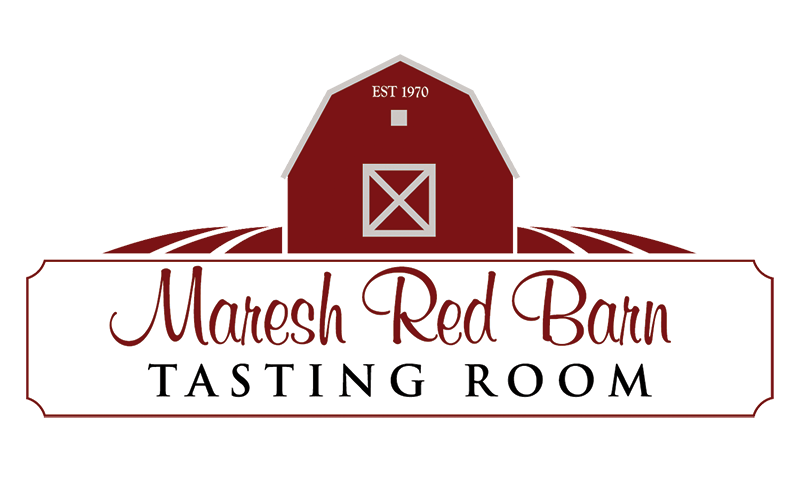Jim Maresh – Grounded & Driven
An interview with Jim Maresh, grandson of vineyard founder Jim Maresh Sr. by Lucy Kiester:
Jim Maresh is busy with his grapes, pressing down massive container after massive container when I arrive to speak with him one early November morning. We talked as he worked – calling over the roar of a power washer spraying off the patio where pressed grapes were moving on through the process of being put into their barrels.
Jim is the wine maker and driving force behind Arterberry Maresh, a relatively recent and remarkably successful label. His Arterberry Maresh label produces only two kinds of wine: a Pinot Noir and a Chardonnay. The vast majority of the label is the strong and well -received Pinot Noir.
photo: Jim and 4th generation on the farm, his son Jim

We shook up the usual interview a bit, starting with two questions:
What sort of a film will view well with the 2011 Arterberry Maresh Pinot noir?
“The Unforgiven” he says, starring the great Burt Lancaster and the glamorous Audrey Hepburn. When asked why he responds with confidence. “This wine will be the best, so it should be paired with the best.”
I particularly appreciate the classy reference to Audrey Hepburn, hinting at the subtle delicacies of the 2011 Maresh Pinot. Overall, Western films are the maverick base of American cinema, and as a pairing choice they are appropriately independent with just a hint of the ornery – hardy enough to ride along with this strong wine.
Selecting such a film pairing is a forceful advertisement for a wine, but it is not undeserved! Jim’s wines have reaped great reviews and awards across Oregon and beyond, so why expect anything different for the 2011 vintage? He intends keep up with this trend by continuing to make what he proudly calls “the best wines in Oregon.”
What is your favorite of your wines and what sport would you watch it with?
Jim takes a moment before deciding which wine was his very favorite he ever made. He settles on his 2008 Maresh Chardonnay. He says that this wine was different. The wine is made from a single row of vines, planted by his mother Martha when she was pregnant with him.
“The 2008 Chard was an unpredictable barrel, and it did some really special things,” explains Jim. “I like how out-there it was.” When pressed on a pairing, he finally decides that it would be best with an Oregon Ducks football game. Like the team, it’s local, homegrown, exciting, and well ranked.
Jim is Grounded in the Land
Jim has no “official” training in wine making; like his grandfather before him he learned by doing. He grew up in the business; his grandfather Jim Maresh Senior is one of the farmers who first planted grapes in Oregon.
Living in the heart of a vineyard since birth has kept Jim grounded in the earth and deeply connected to his Dundee hills. “I’m right where I want to be” he says. He has a deep knowledge of the vineyard and a collection of fascinating stories about the property.
He tells me about a favorite memory: one day he saw a bobcat in the filbert orchard that would not back down from him. He says though he approached to within 50 yards of it the bobcat just didn’t budge – didn’t even bat a whisker. So he decided to move respectfully away and let it do its thing. This bobcat symbolizes the Arterberry Maresh vineyard – small, feisty and so confident it’ll make you pause and rethink your day. Grounded in Oregon land, Jim’s wines won’t back down.
Jim comes by his love of pinot noir naturally. His late father, Fred Arterberry Jr., was a Pinot pioneer in the 1980’s. Fred was the first winemaker in Oregon to produce sparkling wine (Mark Vlosak apprenticed with Fred in 1987 and 1988 before going on to produce his own acclaimed sparkling and Pinot production at St. Innocent). Fred’s 1985 Arterberry Pinot noir garnered a 95 point rating from Wine Spectator. As a tribute, Jim has kept his father’s historic label, modified only slightly to incorporate the Maresh name.
Jim went straight from school to winemaking. He worked for a handful of wineries up and down Worden Hill Road, the gold coast of Oregon vineyards and the location of his family’s farm and vineyard. Neighbor John Paul, owner and winemaker at Cameron was a big influence, says Jim, as well as top winemakers such as John Thomas.
Arterberry Maresh puts out two to three thousand cases a year, and Jim says that is plenty. He makes the wine, sells it, and delivers it himself. He does the accounting, and balances the books. Arterberry Maresh is his, and he likes it that way. He just wants to keep on doing what he does well. In ten years Jim says he will still be right here, making wine.
Jim’s favorite part of the whole process is getting to deliver the wine. He says it’s always sad to see the end of a run, especially the ones you know are great, but that he appreciates when people want his wine so much that it sells out.
When asked about his 2011 Pinot Noir Jim says it is amazing. It’s the first vintage he made on his new facilities, and he feels the wines will be all the better for it. The grapes hung on the vine until November before they were harvested resulting in “just really great wine.”
When asked which award makes him the proudest Jim hesitates before shooting me a little smile. “I’m most proud of every time I sell out of a wine, that’s the greatest accolade I could get.”
Dirt N Details
Jim is a farmer, not a winemaker. He knows this, and he is proud of it. He doesn’t want to be mistaken for something he’s not. “I think you really need to have a background in chemistry if you are going to make wine” Jim states. Since that is not his background, he doesn’t make the wine. He grows the grapes and he knows he does it very well.
“Soil is alive” says Jim. In order to grow the best vines it must be treated as such. He sees soil as a “micro-population.” If you protect your soil, keep it healthy and strong, then your crops will be the strongest, immune to many attacks. The Maresh farm is on 12 feet of clay loam. “The soil is down deep, so the roots need to run deep too!” He freely admits that his style of farming might not work on different ground, but for the Oregon red clay of the Dundee hills, his system is perfectly suited.
Jim has what is called a “dry farm.” There is no irrigation for his vines, no watering that occurs aside from what happens naturally. Because the roots are set way down in the deep soil, they draw water from the winter and spring rains and from any water stored underground.
Jim also keeps his vines spaced out. He uses California spacing of 6’x12′. He also only plants 600 vines per acre rather than the more common 1000/acre. He likes the air and the drainage that more space provides. The exposure to air and sunlight helps make his grapes some of the best Oregon has to offer. Why crowd the vines together? Give them space and let them grow!
He is careful to always have a cover crop put in by April 10th each year to protect the moisture retention of the earth. Martha remembers that as children, she and her siblings made forts and mazes in the five foot high red clover growing between the rows. Dry farming is the system that he cherishes. Jim is slightly dismissive of the fancy irrigation systems many new vineyards are so quick to install. “All it takes is a little faith in the hills and care of the vines to be sure that the roots are deep enough to stay strong,” says Jim.
In 2013, at the age of 87, Jim still works the land and is proud of every inch of it, knows every vine and plot inside and out. Like any true farmer he has his favorite spot.
In over 100 acres of land, Blocks 3 and 4 are his favorite. They consist of some of the oldest vines on his property, planted in ’71 and ’74 respectively, comprised of Pinot Noir vines of the Wadenswil and Pommard varieties. The site itself is nice and warm: “A magic spot” says Jim.
He goes on to explain that the pinot noir grapes in general are all different, sort of like his children- a unique style or strength in each block. But 3 and 4 are special because the grapes there are sort of like Loie: mellow, smooth, and feminine. These grapes have unique depths, and make practically perfect wine.


